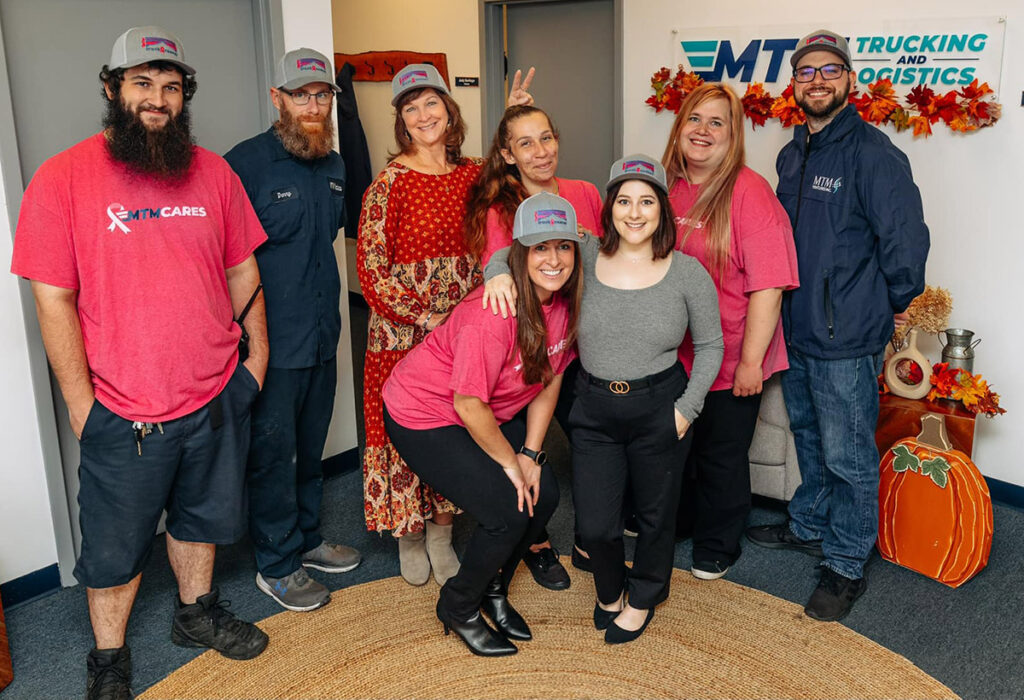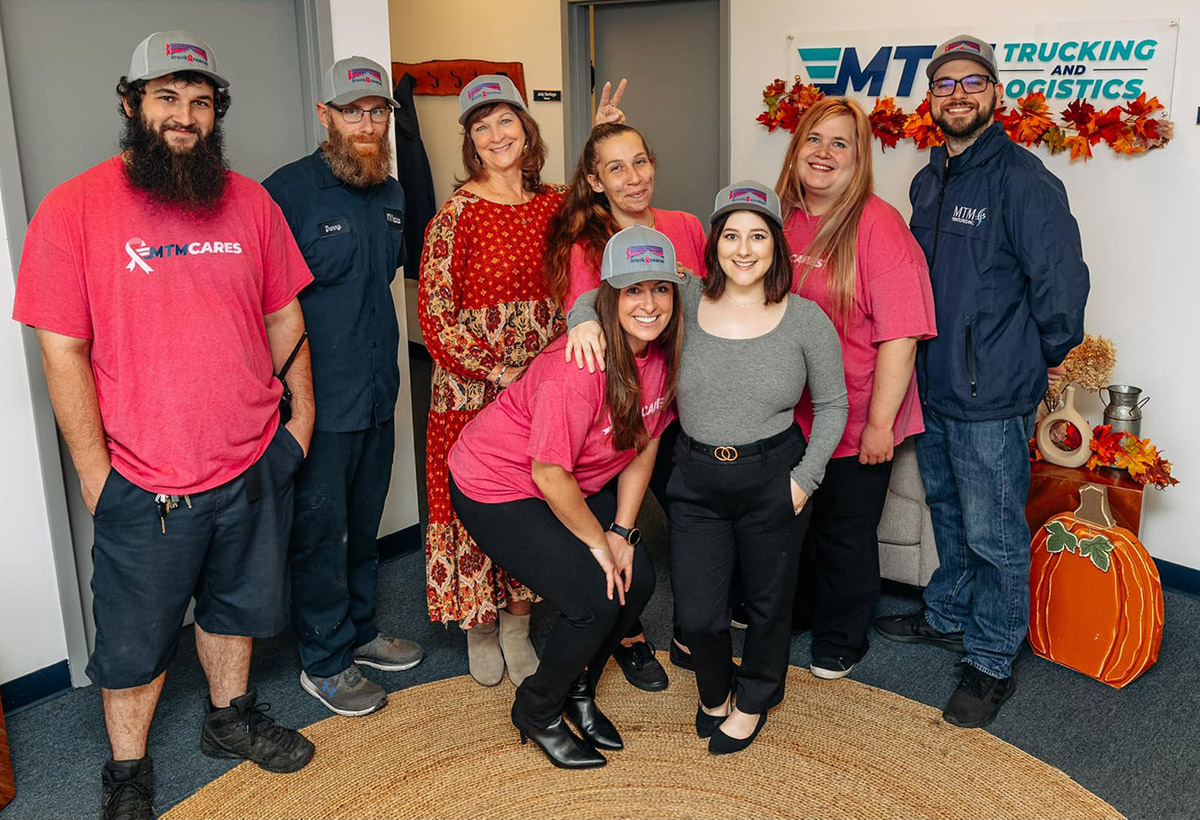MTM's approach: Proactive, workplace-centric, safety-focused
The American Transportation Research Institute’s (ATRI) 2024 Top Industry Issues report highlights significant challenges and trends in the trucking sector, which companies such as MTM Trucking and Logistics are navigating. For MTM, this report mirrors many of the issues already identified as priorities for the MTM team.
“These issues fall directly in line with what we have seen this year at MTM,” said Taylor Santiago, MTM’s vice president. “We’ve continued to focus on growth while tightening our processes so that we are more efficient and can deliver the most for our customers.”
More than 3,700 trucking industry stakeholders participated in this year’s survey, including motor carriers, truck drivers, industry suppliers, driver trainers and law enforcement, among other groups.
Nearly half of the survey respondents were motor carrier executives and personnel, while truck drivers represented 31 percent. This annual report is used by federal and state Departments of Transportation (DOTs) to better inform decision-making, by motor carriers to monitor driver concerns, and by industry suppliers to develop new market resources.
The economy remained top of the list of concerns, but continued focus on transitioning the nation’s truck fleet to battery electric – and the aggressive timelines and significant cost for doing so – drove Battery Electric Vehicles into the industry’s sixth overall concern, up four spots from last year.
The challenges of electrifying vehicles and supporting the truckers during such a transition are clear to Santiago and her team at MTM. “We have been very involved with the TCA (Trucking Carriers Association) in gathering information about the challenges ahead,” said Santiago.
Here are some of the key issues and their implications for MTM and the rest of the industry:
Economic Pressures in 2024
Not surprisingly, the economy again emerged as the top issue in the ATRI survey, which the organization has conducted for more than 20 years.
The trucking industry has endured a prolonged freight recession, beginning in 2022, with freight rates in decline and volume stagnant. For many trucking firms, this economic strain amplified the challenge of balancing operating costs against reduced revenue opportunities. Fuel costs, though slightly lower in 2024, remained higher than pre-pandemic levels, tightening profit.
The larger economy grew steadily, with a 3% increase in GDP during Q2 2024 and inflation cooling to 2.5%. However, manufacturing output and retail sales — the backbone of trucking demand — remained stagnant.

But while the economic woes forced thousands of trucking companies out of business in 2024 and prompted layoffs among other companies, MTM added to its fleet and bolstered staffing with several key changes.
“We were fortunate to be able to add two full-time staffers and improve efficiency by building on our already solid structure,” said Santiago. “In 2023 we replaced 50% of our trailers with 2024 models. We continued growing in 2024 by adding six additional assets. In 2025 we plan to continue this growth.”
Rising Operational Costs
One of the steepest challenges highlighted by ATRI was escalating insurance costs, which increased by 12.5% in 2023 and continued to rise in 2024. For small carriers such as MTM, these surges, coupled with large verdicts in crash-related court cases, heightened financial vulnerabilities.
Moreover, risk-related costs like cargo theft and predatory towing became significant concerns, as the industry pushed for reforms to mitigate these burdens. For MTM, these issues underscored the importance of strategic investments in technology and partnerships to safeguard assets.
Over the past year, MTM has continued to emphasize safety initiatives for drivers, including providing incentives for safe driving. Those safety initiatives help keep insurance costs down.
MTM was also proactive in operational standards that protect the company. By working with the Insurance Office of America and trucking compliance consultant Atlantic Investigations, MTM was able to mitigate the insurance cost surges with guidance in setting standards and painting a portfolio of MTM’s procedures.
“Being proactive has provided a backbone for our fleet, giving drivers the support they need to go out on the road and confidently drive every day,” Santiago said. “We have appropriate and thorough coverage and the partners we need to protect us from big insurance threats.
“If you do not have procedures in place, the energy required to deal with insurance issues is daunting, and takes away from focus on our other priorities.”
Research also shows that fleets that belong to state and national trucking associations have better safety records than their peers who have never joined. MTM is a member of TCA, MMTA (Maryland Motor Truck Association) and the Traffic Club. MTM also stays in the loop with the Maryland Port Association and the Federal Motor Carrier Association.

Infrastructure and Parking Challenges
Infrastructure failures, like the collapse of the Francis Scott Key Bridge in Baltimore, directly impacted logistics in Maryland, where MTM is headquartered. Despite new funding for truck parking under the Infrastructure Investment and Jobs Act, parking shortages persisted, adding logistical challenges for MTM’s operations and concerns for driver safety.
Some of these issues affect drivers industrywide, but are less of an impact on MTM’s daily operations. However, the MTM team’s investment in the industry as a whole encourages sharing of its practices with others at national and state meetings.
“Almost every single exit ramp in Maryland has tractor-trailers lined up,” said MTM Vice President of Operations Ryan Penix. “The lack of parking for trucks on U.S. roads is clear.
“We are fortunate that at MTM most of our drivers return home every day, but this is an industrywide issue, and we care about policies that improve this critical situation for drivers.”
The lack of safe parking options consistently already ranks among the top challenges facing drivers today, according to the American Trucking Associations, the largest trade association for the trucking industry. That’s particularly true for women, who cite the lack of safe parking as a major barrier to more joining the trucking workforce.
The ATRI found drivers on average sacrifice 56 minutes of drive time every day to secure parking.
“Because we have such consistent routes and longtime drivers who are familiarity with areas we do not run into the same issues as many drivers in the industry,” Penix continued. “That doesn’t mean we don’t take seriously the impact of parking shortages.”
Evolving Regulatory Landscape
The upcoming 2027 Battery Electric Truck (BET) sales mandate sparked debate over the feasibility of widespread adoption. For MTM, a smaller company, these regulatory shifts posed potential compliance challenges and opportunities for innovation.
Industrywide, there is concern over the EPA ruling that sets annual limits for carbon emissions that are reduced each year and vary by truck size and classification. Existing standards begin to tighten for model year 2027 and become more stringent through model year 2032.
“With the administration change the regulatory timelines are in flux,” Penix said. “We continue at MTM to approach the future with procedures and technology that emphasize better fuel utilization and overall environmental responsibility.”
Technology and Innovation
The integration of artificial intelligence (AI) in trucking operations represented a potential game-changer. From route optimization to predictive maintenance, these tools offered pathways to enhance efficiency across the industry.
 MTM has invested a great deal in technology and operations in the past four years, implementing highly sophisticated Samsara software that allows for continuous tracking and operational evaluations.
MTM has invested a great deal in technology and operations in the past four years, implementing highly sophisticated Samsara software that allows for continuous tracking and operational evaluations.
“The results of the technology and operations improvements have been stark,” Penix said.
“When we started tracking data such as harsh driving events and speeding we started seeing the results,” he said. “When we rolled out a new safety program in July, drivers learned even more about how their actions on the road affect the entire organization.”
Having these tools available to us have helped drivers embrace these procedures.
“We are able to share with the drivers data such as fuel utilization,” Penix said. “All these safety and efficiency issues we have talked about for years are now quantifiable because we can show the impact of changed behaviors.”
Safety is a top priority for all the MTM drivers, including Tonia Wong-Mills, who was honored early in 2024 by the state of Maryland for her safe driving record.

Workforce Concerns
The persistent driver shortage and challenges with driver retention remained top issues in the industry. The reduction in total truck transportation employment by 2.7% from January 2023 to September 2024 reflected industry-wide recruitment struggles.
At MTM, a family-owned company that puts a premium on valuing employees, driver longevity is a source of pride. The employee-centric environment at MTM creates a consistency in operations that serves both the drivers and the customers, said operations leader Penix.
MTM’s focus on retaining experienced drivers and creating competitive compensation packages has been critical in navigating this tight labor market.

Longevity at MTM far outpaces the industry; MTM employees have been on the team an average of 10 years. That includes drivers, who range from one to more than 12 years.
“Because of our reputation as a company that cares for its drivers and their safety, more than 90% of our driver hires are recommendations from current drivers or team members,” said Penix.
“At MTM, we aren’t just a workplace, we are a work family,” said Amanda Dobrochowski, who with the rest of the core office team plans workplace gatherings and contests such as the recent Soup-Off, Thanksgiving feast and Truck Cancer campaign.
There also are employee recognitions such as the Employee of the Year award.
Looking Ahead for MTM Trucking
For MTM Trucking and Logistics, 2024 was a year of navigating economic challenges, rising operational costs, and evolving regulations while striving to maintain resilience. Investments in technology, proactive risk management, and adapting to policy changes will continue to shape the company’s strategy moving forward.
This retrospective underscores the significance of ATRI’s findings in shaping industry practices and highlights MTM’s role in Maryland’s trucking landscape as it continues to evolve and grow in the next year and in the future.





